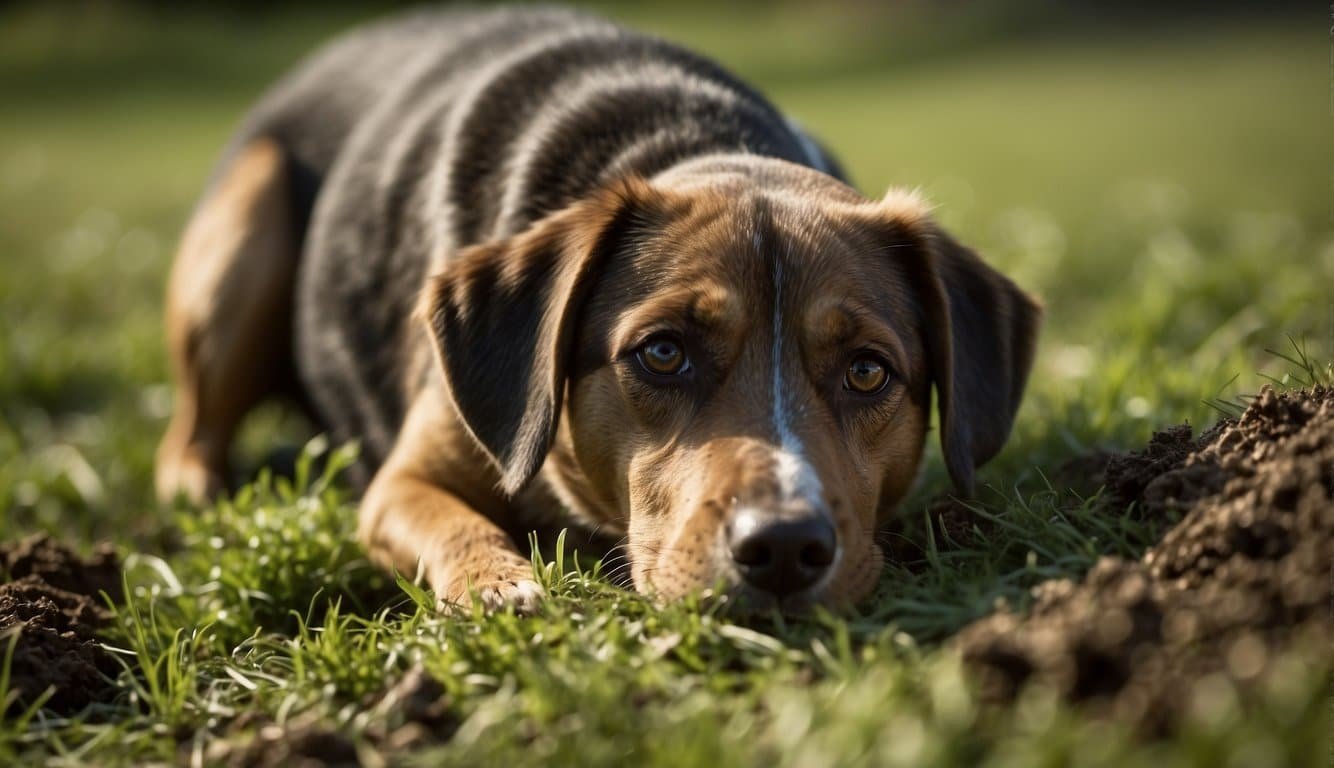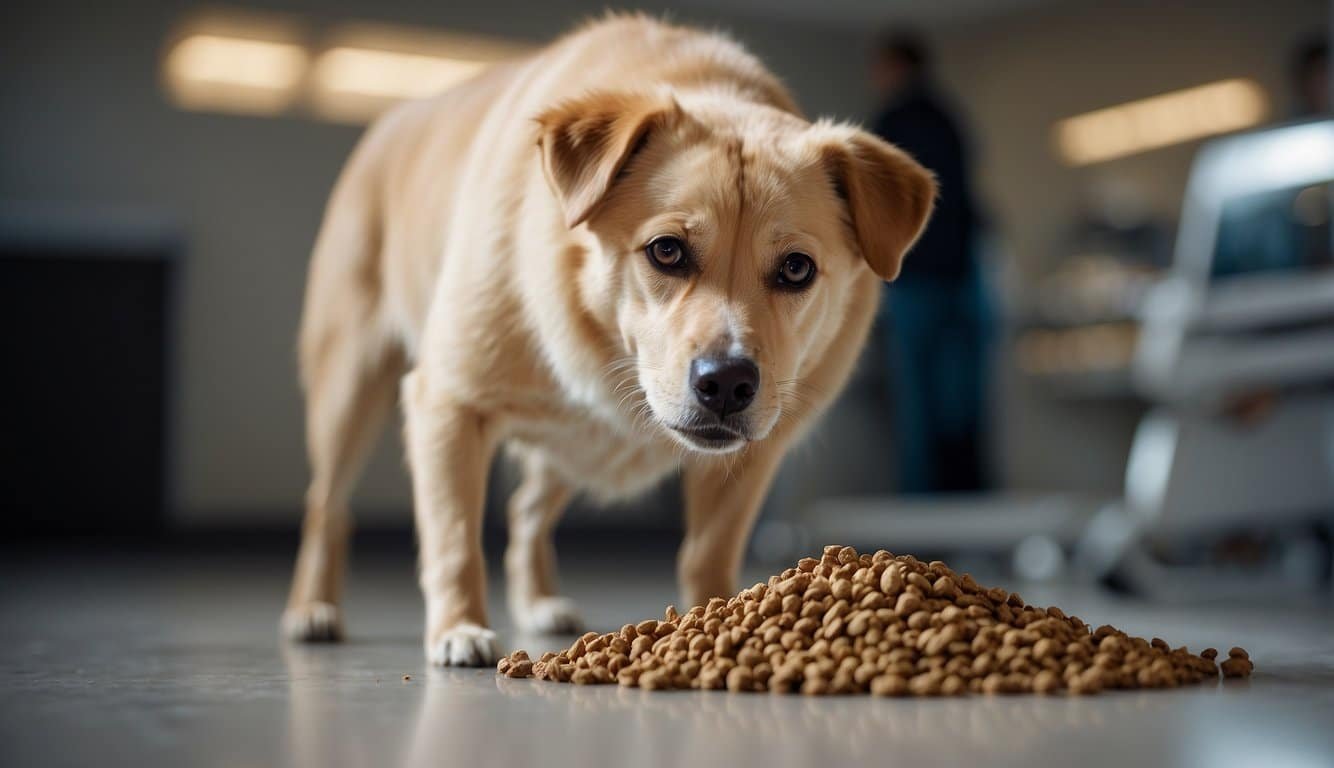Understanding Coprophagia in Dogs
When it comes to understanding why some dogs engage in the somewhat shocking behavior of poop-eating, it’s important to consider both instinctual habits and possible underlying health issues.
Canine Instincts and Behavior
Dogs have a variety of behaviors and instincts that can sometimes seem odd to humans. Coprophagia, or the consumption of feces, is one such behavior that can be quite normal in certain contexts. For example, mother dogs will often eat the feces of their puppies to keep the den clean and protect the litter from predators attracted to the smell. Puppies may eat feces out of curiosity or mimicking other dogs. Learning why dogs eat poop can be as much about understanding a dog’s environment as it is about the animal’s intrinsic habits.
- Normal Behavior in Mothers: Mothers cleaning after their litter.
- Puppy Curiosity: Exploratory behavior in young dogs.
- Environmental Influences: Dogs imitating others or reacting to their surroundings.
Health and Nutritional Issues
There are various health and nutritional issues that can lead dogs to eat feces. Nutritional deficiencies can drive dogs to seek out alternative sources of nutrients, potentially leading them to consume poop. Conditions that affect a dog’s ability to absorb nutrients, like malabsorption, can have a similar effect. Even certain diseases such as diabetes, thyroid disease, and Cushing’s disease may also be connected with coprophagic behavior. Dog owners should consult a veterinarian if coprophagia becomes a consistent habit, as it might signify a deeper medical issue.
- Seeking Nutrients: Compensating for lacking diet.
- Malabsorption Syndromes: Problems with nutrient absorption in the gut.
- Medical Conditions: Diabetes, thyroid disease, and Cushing’s can increase feces-eating behavior.
- Intestinal Parasites: Another medical reason to engage in coprophagia includes the presence of parasites that may cause dogs to eat feces in an attempt to address discomfort.
Common Triggers and How to Address Them

Many dog owners are puzzled and often disgusted when they catch their canine companion eating poop. This behavior, scientifically known as coprophagia, has a range of triggers from boredom to nutrient deficiencies. Exploring these triggers and implementing targeted solutions can significantly help reduce or eliminate this unwelcome habit.
Behavioral Factors and Management
One contributing factor to coprophagia is anxiety. Dogs may feel stressed due to a change in environment or routine, leading them to eat poop. Addressing this requires identifying and reducing sources of anxiety. Providing a stable environment, consistent routine, and plenty of positive reinforcement can ease their stress.
Attention-seeking is another behavioral trigger. Some dogs learn that eating poop gets a reaction from their owners, and they may do it to obtain attention. Ignoring the behavior and giving attention for positive actions instead can be an effective behavior modification strategy.
For those dogs who may eat feces out of boredom, increasing activity levels and enrichment opportunities is key. More exercise and interactive toys can keep a dog engaged and reduce the tendency to engage in poop eating. Dog training exercises like “leave it” and “recall” can also provide mental stimulation and bolster impulse control.
Preventive Measures and Solutions
Employing preventive measures can go a long way in curbing this behavior. Limit access to feces by maintaining a clean yard and during walks, keeping the dog on a leash to prevent them from reaching feces can help. For some dogs, improved kennel management and supervision when they’re outside may be necessary.
Incorporating training into daily routines can also help. Commands like “leave it” can be taught through positive reinforcement, rewarding the dog for obeying and thus discouraging the behavior. Consistent behavior modification strategies tend to have a positive long-term effect.
When a habit is already established, these tools alongside patience can aid in redirecting the dog’s behavior towards more acceptable habits. Consulting a professional dog trainer or a veterinarian may also provide tailored strategies for your dog’s specific situation.
Dietary Strategies and Professional Help

When a dog engages in eating feces, often referred to as coprophagia, dog owners can explore dietary strategies and seek professional help to address the issue. Here’s how improving their diet and consulting a vet can make a difference.
Improving Your Dog’s Diet
Optimizing a dog’s diet is the first defense against coprophagia. Ensuring they receive a balanced diet with the right mix of proteins, fats, carbohydrates, vitamins, and minerals is crucial. If a dog’s diet lacks important nutrients, it might lead to unusual eating habits, including the consumption of feces. Some dog owners have found success by adding dietary supplements like vitamin B1 or enzyme supplements to their pet’s meals to combat deficiencies. Others suggest that certain foods like pineapple may deter dogs from eating poop due to the change it imparts to the taste of their feces. These dietary adjustments are often proposed to influence a dog’s inclination towards this unwanted behavior.
- Add pineapple to your dog’s diet; its taste can make feces less appealing.
- Include enzyme supplements to aid digestion and absorption of nutrients.
When to Consult a Vet
If dietary changes do not resolve the issue, it may be symptomatic of a deeper medical issue such as pancreatic insufficiency or a nutritional deficiency. A veterinarian will be the most reliable source to identify any underlying health problems. They can recommend specific supplements or treats that can be part of a plan to discourage the behavior. Moreover, if a behavioral cause is suspected, a veterinarian can guide dog owners to appropriate resources or specialists to address the matter. They can offer actionable advice on reducing the opportunity for a dog to engage in coprophagia, like frequent cleanup of feces, and provide information about various health concerns linked to this behavior.
- A vet can assess potential nutritional deficiencies.
- Professional help might be needed for underlying medical issues.
Readers interested in understanding how a balanced diet plays a role in preventing dogs from eating poop might visit “Canine and feline nutrition: a resource for companion animal professionals”, while those looking for a nutritional science perspective on the interaction between diet, pet, and disposal of feces can check out the article on “Unconventional diets for dogs and cats”. Those who are interested in a detailed analysis of dog and cat nutrition, and the appearance of food or food marker in feces, can refer to “Nutrient requirements of dogs and cats”.

